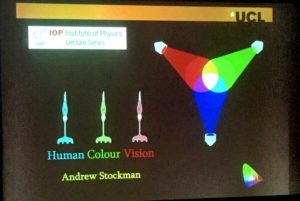Open University IoP Lecture Series
Posted: Fri 16 December, 2016 Filed under: Domestic, Education, Geeky Leave a comment »I didn’t really explain much about the IoP Lecture Series at the Open University in the last post.
I’m lucky enough to live quite close to the Open University‘s main campus in Milton Keynes, although up ’til this week I hadn’t actually ventured on/in to it.
I was made aware of the Lecture series a few weeks ago, by a friend who’d been to one of the earlier events. Basically, it’s a collaboration with the Institute of Physics, and consists of free lectures (open to the public) on a range of subjects. I’m sure there’ll be ones I’m less interested in, but being a bit of a geek – OK, a lot of a geek – I’m always open to learning about new stuff, so I’ll take something out of all the ones I’ll get to go to.
I’m hoping that in 2017 I’ll do some more learning, both random stuff and more organised/official, and this Lecture Series will definitely be part of that…
Open University IoP Lecture – Human Colour Vision
Posted: Thu 15 December, 2016 Filed under: Domestic, Education, Geeky, Milton Keynes Leave a comment »This week, I was lucky enough – or at least organised enough – to go and see a lecture at the Open University campus as part of their IoP Lecture Series, about Human Colour Vision, presented by Professor Andrew Stockman.
It was interesting, and covered the basics of both the biology and physics of human vision, as well as how easy it is to fool and confuse vision.
Being a bit of a vision geek, I understood most of the information coming in – although it seemed to boggle the minds of a fair few of the audience – but I still learned stuff about how light and colour are initially processed by the eye (“univariance” being particularly interesting) and the cell structures etc. that aid this process.
As always, the ways to mess with the brain about colour fascinate me – and although we didn’t see my two favourite images (below) on colour perception, there were others that were just as fun.
I’m hugely lucky, in that I live near the OU campus, so it makes it an easy evening of geekery – I didn’t know about this IoP series of lectures until recently, but you can be sure I’ll be going to more of them…
Badly Worded
Posted: Wed 30 March, 2016 Filed under: Advertising, Bad Ads, Central Bedfordshire Council, Customer Services, Education, Literacy, Thoughts Leave a comment »Just now, my local authority (Central Bedfordshire council) tweeted this, which is hilariously badly-worded…
I replied, asking them if they meant that it was an event for underage drinking/drinkers, or if they meant it to be an event informing about (and/or preventing/reducing) underage drinking – as it certainly looked like the former.
In fairness, they then responded, and removed the original tweet.
But still, it made me laugh, picky and pedantic bastard that I am.
[UPDATED]
They then replaced that tweet with this one…
It really isn’t a good day for Central Beds’ social-media team. But it’s a very funny one for me…
School Internet Tracking
Posted: Tue 22 December, 2015 Filed under: Cynicism, Education, News, Politics, Thoughts Leave a comment »Interesting to see today that there are new proposals to monitor the internet usage of all school pupils, ‘to prevent radicalisation’. (Because yeah, of course that’ll work)
It’s interesting to me, because I’d thought that was in place already – certainly at least twenty years ago, Research Machines did a whole internet-monitoring and dubious-link-blocking system, and I’d kind-of assumed that was the de-facto standard for schools even now. Apparently not.
It was certainly one of the strangest temp/contract jobs I’ve ever had – I worked for RM for three months, and the job description was to spend that time finding dodgy sites, so they could be added to the blacklist, and RM’s firewalls would then block those sites from being seen. So yes, the job was basically to look for porn. It was a challenge, honest. *cough* (Having looked, RM do still do ‘online safety’ stuff for schools, so I wonder why it’s not the standard. Maybe they’re priced themselves out of the market, or there’s just more companies that do it, and their market-share has shrunk. I dunno)
However, I don’t think it’ll be easy to do anything that will block the access now. There are too many routes – and any vaguely tech-savvy child will be able to go outside the school-enforced network on their own devices etc. Sure, you can lock a school-owned device (computer, iPad etc.) to the school network – but you can’t do the same for their own devices. On those, there’s always public wi-fi, and even ‘just’ the usual 3G/4G connection. And whatever internet access is available at home, and anywhere else.
Also, as with so much of this ‘monitoring’ crap, I’m sure it’ll only be of use once something has happened. There’s nothing that can proactively monitor these things, or flag up significant warnings beforehand. All the monitoring can do is provide a record, to say “This is what they looked at before they did something that brought them to our attention”, in true “locking the stable-door once the horse has bolted” style. As usual.
Job Envy
Posted: Fri 2 January, 2015 Filed under: Animals, Change, Education, Introspective, Media, Thoughts Leave a comment »It’s not often that I get envious of someone else’s job – but over the last month there’s been one man on TV whose life I could envy deeply. That man is Giles Clark, a tiger expert based at the Australia Zoo in Queensland. (Which is the one founded by Steve Irwin, which explains a lot)
He’s been the subject – well, the human subject, at least – of the BBC series “Tigers about the House”, where he raised two Sumatran tiger cubs by hand in his own house.
The Australia Zoo’s tigers are all fully acclimatised to having humans around – which allows them to go for walks with their keepers and so on, as well as lots of enrichment and stimulus that simply doesn’t happen in most zoos around the world. It’s been quite a spectacular thing to see – particularly the tigers leaping into their huge pool (tigers love to swim) with the cameras right there with them – and yeah, decidedly envious.
Additionally, because they’re so acclimatised to people, it means the Zoo can also offer “Up-close experiences” with the tigers (and other animals) for a fee. All the money made from those experiences – as well as photo-opportunities and the like – goes towards tiger conservation projects, and the series included Clark’s trips out to Sumatra to see those projects as well, and be involved with them.
I’m not a great fan of zoos in general – I don’t like seeing animals in cages, regardless of the size of those cages – but recognise that they now have a massive use in keeping certain species from extinction. But if there’s got to be zoos, I’d far rather they were like this, providing so much more than just “animals in enclosures”.
But yes, definitely envious of that kind of job. It’s one of the very few times where I look and think “If I’d could go back now and re-do secondary school etc., knowing what I do now, that’s the kind of work I’d aim for”
For information:
- Episode one is on iPlayer here ’til the end of January 2015
- Episode two is on iPlayer here ’til the end of January 2015
Attention To Detail
Posted: Fri 9 May, 2014 Filed under: Cynicism, Domestic, Education, Literacy, Pedantry, Thoughts Leave a comment »While filling in my postal vote last night, I noticed this on the paperwork…
The red dot is added by me, just to highlight the error.
But really, how can I be assured that my local authority is capable of anything efficient when they can’t even get things right on a bloody envelope?





